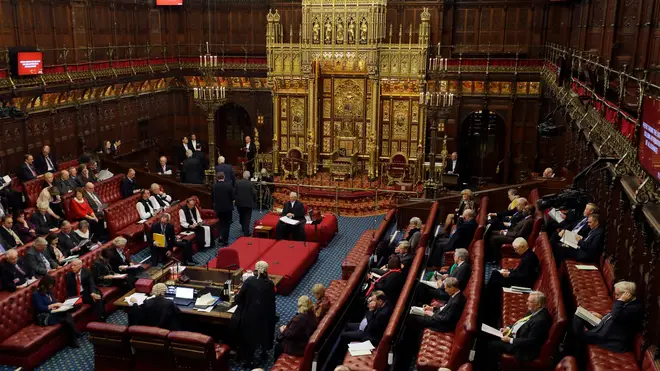
Lewis Goodall 10am - 12pm
26 October 2020, 19:56 | Updated: 26 October 2020, 19:59

Peers are preparing to strip out controversial parts of the government's Brexit legislation that would allow ministers to break international law.
The UK Internal Market Bill is being meticulously scrutinised in the House of Lords and is currently set for four days of consideration at committee stage.
Once ratified, the legislation will dictate how trade within Britain will work once the country leaves the European Union's single market and customs union at the start of next year.
However, cross-party amendments have been tabled to remove parts of the Bill that have proven to be divisive, with a particular focus on government additions that would give ministers the power to breach the terms of the Withdrawal Agreement (WA) - the Brexit divorce deal - that was agreed with the EU last year.
The amendments are in the name of Lord Judge, a former lord chief justice, shadow attorney general Lord Falconer of Thoroton and Conservative former leader Lord Howard of Lympne. They also have the support of Liberal Democrat Lords leader Lord Newby and the Bishop of Leeds, the Rt Rev Nick Baines.
Read more: Talks on post-Brexit trade deal continue as Barnier stays in London
Read more: Government suffers major defeat in House of Lords over Brexit bill

German MEP's scathing attack on Boris Johnson over Brexit
During committee stage, peers go through every clause of a bill and decide whether they agree on them before having the chance to vote on any amendments.
Once the legislation has been fully scrutinised line-by-line, it is then reprinted with all the agreed amendments included, before moving on to report stage for further scrutiny.
Labour has suggested peers could hold votes at committee stage next week rather than waiting for report stage where votes on matters connected to legislation usually occur.
The government has repeatedly insisted powers to override the WA are necessary to protect the relationship between Great Britain and Northern Ireland.
But critics have argued the powers have "no place in this Bill", with former Tory prime minister Theresa May among those vocally opposed to them and instead recommending an arbitration process to resolve issues.
Read more: Business groups say cost of everyday items 'could soar' with No Deal
Watch: Brexit voter didn't know Australia deal and No Deal 'were the same thing'

Business Minister sets out the difference between an Australia-deal and a No-Deal Brexit.
Peers last week heavily defeated the government on a "regret" amendment, which condemned the powers and warned they "would undermine the rule of law and damage the reputation of the United Kingdom".
If ministers see the controversial clauses removed, they will then need to try reintroducing them via the Commons if they feel they are still necessary given the state of Brexit talks.
Speaking during day one of committee stage on Monday, Labour's Lord Falconer said other countries will believe the UK is "not reliable" given it is threatening to override the WA.
He added: "You also trash our reputation as a country by doing it. As it happens, you make this government an absolute laughing stock."
However, Cabinet Office minister Lord True said the legislation delivers on the government's commitment to providing Northern Irish businesses with "unfettered access" to the whole of the UK market, adding the government believes the Bill "does not infringe the rule of law".
Meanwhile, shadow business minister Baroness Hayter of Kentish Town said other parts of the legislation - not just part five connected to Northern Ireland and Brexit - also require reforming.

Starmer: It's in the national interest to have a Brexit deal
Opening day one of committee, she said: "With the Agriculture Bill, the government refused to accept a UK-wide commitment to retaining food standards - and I gather Prue Leith has resigned from the Conservative Party in reaction to that rejection.
"However, more importantly for this Bill is just because the UK Government doesn't want to guarantee high food standards for consumers, it doesn't mean other countries in the UK don't want to do that.
"So as we roll out a new internal market for the UK, it's essential that an overarching objective of the legislation - the interest and wellbeing of consumers - is written on the face of the Bill."
Senior Tory peer Lord Cormack also warned the government not to "ride roughshod" over devolution settlements struck with Scotland, Wales and Northern Ireland.
He said: "If we do, we will truly endanger the future of the UK."
Lord Comack added it would be a "constitutional and political tragedy" if the devolved nations were to break away from the UK and urged ministers to "head off the forces of English nationalism".